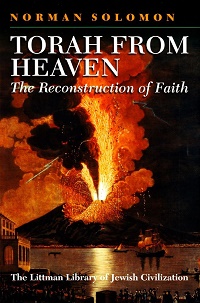 Edit article
Edit articleSeries
Myth of Origin and Narrative Theology: Rabbi Norman Solomon

Rabbi Norman Solomon
A more recent version of revelatory minimalism that might address these concerns while avoiding the drawbacks of Leibowitz’s position is the recommendation of Jewish Studies scholar, Norman Solomon, in a book appropriately entitled “Torah from Heaven.” Solomon recommends that the logical status of this doctrine be changed from historical truth to a foundational myth of origin.[1]
While Solomon’s academic orientation is more theological and philosophical, his approach to the biblical text – like that of Kugel[2] – does not stem from any reliance on Leibowitz’s radically absolutist view of God’s transcendence, which are still Kantian in essence.[3] But in addition to the weight of critical scholarship, Solomon’s appeal to myth can also be attributed to the influence of post analytic philosophy of the Wittgenstinian variety and its insights regarding the function of religious language.[4] It is arguably this background that induces Solomon to grab the problematic aspect of Torah from Heaven’s metaphysical claims more directly by the horns, when he confesses:
At the beginning of this book I recollected how, as a child, I sat in the synagogue and mused about the meaning of ‘The Lord spoke to Moses saying’. I still don’t understand it, though I am less worried than I was. Nor have the great scholars and theologians who debate such weighty matters enlightened me yet, so I must resign myself to continuing uncertainty and confusion.[5]
In diminishing the importance of understanding precisely what is meant by God’s speech (or even of affirming that an actual event, whose witnesses collectively experienced as revelatory, indeed took place) and labeling the belief in Torah from Heaven a “myth of origin”, Solomon, like Leibowitz, implies that the purpose of religious language is not to impart information – metaphysical or otherwise. But there is a difference in the degree of receptivity to the original text that the views of Leibowitz and Solomon mandate.
Because Leibowitz still appeals to a form of reasoning beyond religious discourse in stipulating the existence of a God whose transcendent nature is beyond the ken of human understanding, and not revealed in history, he is driven to demythologize the “religious facts” described in the Torah which purport to talk about God and His relationship with the world.[6] Instead of taking such descriptive statements at face value, Leibowitz relates to them as value judgments and prescriptive directives for behavior, so that they will not clash with his pre-conceived theological views. Solomon’s understanding, by contrast, allows him to accept the mythic formulations unconditionally, with no theological strings attached.

Read An Excerpt Here
Irrespective of questions regarding their original intent and context,[7] Solomon’s point is that it is only when biblical narratives are treated strictly as history that questions of “accuracy” become appropriate, and the need to formulate apologetic resolutions with an eye to contemporary sensibilities arises.
When treated as a myth of origin, the traditional account of revelation – even if it appears today as entirely fictitious or overwhelmingly inaccurate – can still bear theological validity as it stands. Its rationality or “truth” is maintained not by appeal to external evidence or re-interpretation, but in its ability to discharge its mythic function, imbuing those who appropriate it with a sense of allegiance to the past and inducing them to relate to the received text of Scripture as sacrosanct.[8]
The Wittgenstinian flavor of Solomon’s approach is corroborated by his allusion, in passing, to some measure of affinity with the concept of “narrative theology”,[9] now fashionable in some Christian circles identified as “post-liberal”. While rejecting the salvific significance that Christians find in reading Scripture in general and in telling the story of Jesus in particular, Solomon acknowledges some similarity between this Christian trend and the role that he accords to biblical narrative in constructing Jewish self-understanding.
In both cases, the diminished emphasis on the propositional value of religious truth statements is easily traced to the influence of Wittgenstein’s later thought (see excursus below), which viewed religious language as a category of discourse that imparts its own particular “form of life” to those who participate in its “language game” and its distinctive “grammar”. More importantly, the appeal to the role of narrative in both cases releases believers from the need to read and interpret verses in a strained and artificial manner, in order to support preconceived doctrinal positions.
TheTorah.com is a 501(c)(3) nonprofit organization.
We rely on the support of readers like you. Please support us.
Published
March 25, 2014
|
Last Updated
October 21, 2025
Previous in the Series
Next in the Series
Before you continue...
Thank you to all our readers who offered their year-end support.
Please help TheTorah.com get off to a strong start in 2025.
Footnotes

Prof. Tamar Ross is Professor Emeritus of the Department of Jewish philosophy at Bar Ilan University. She continues to teach at Midreshet Lindenbaum. She did her Ph.D. at the Hebrew University and served as a post-doctoral fellow at the Center for Jewish Studies at Harvard. She is the author of Expanding the Palace of Torah: Orthodoxy and Feminism. Her areas of expertise include: concepts of God, revelation, religious epistemology, philosophy of halacha, the Musar movement, and the thought of Rabbi A.I. Kook.
Essays on Related Topics:









